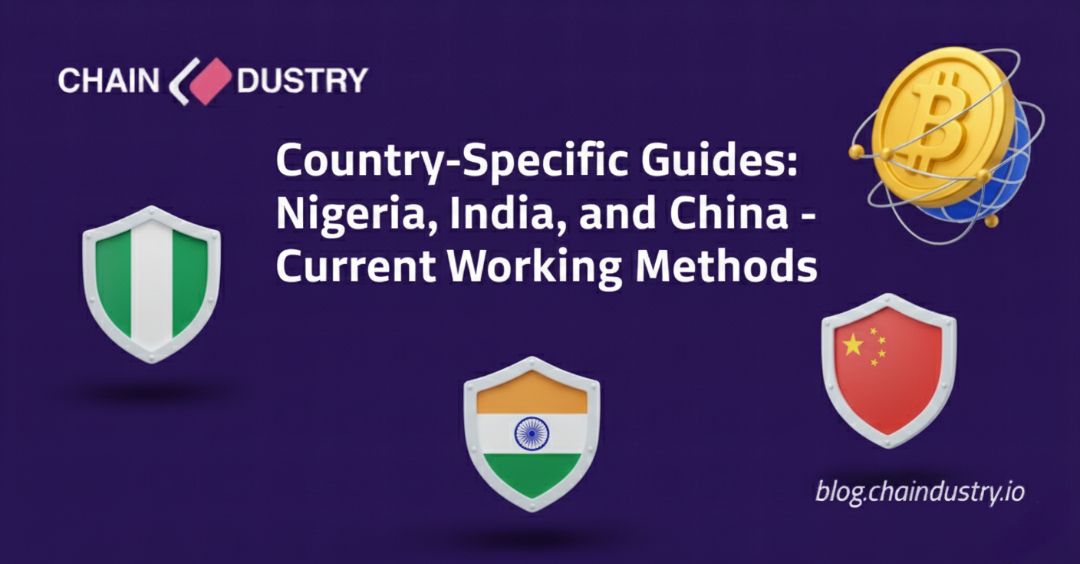Introduction
Buying crypto in countries with strict regulations or outright bans isn’t impossible, it just requires strategy. In 2025, millions of users across places like Nigeria, India, and China are still finding legitimate ways to access digital assets despite restrictions on centralized exchanges. Whether for remittances, savings, or online business, the global demand for crypto remains unstoppable. Governments may slow it down, but innovation keeps breaking barriers — one wallet at a time. This article breaks down the most effective, legal, and practical ways people are safely buying and holding crypto in restricted regions today.
Why Crypto Access Is Still Restricted
While blockchain adoption continues to grow, many governments fear losing control over capital flow, currency policy, and taxation. Some common reasons for restrictions include: • Anti-money laundering (AML) laws that target untraceable transfers • Currency control policies to stabilize local currencies • Political motivations, especially where financial freedom is seen as dissent The result? Many people face closed banking rails or exchange shutdowns but not total exclusion.
The Safe and Working Methods in 2025
1. Peer-to-Peer (P2P) Marketplaces
Still the most reliable method in 2025, P2P platforms allow users to buy and sell crypto directly with each other using local payment methods. Platforms like Binance P2P, OKX P2P, and Bybit P2P remain active in several restricted regions. They use escrow systems that hold funds securely until both parties confirm the trade. For example, in Nigeria, users continue to rely on P2P even after the Central Bank’s restrictions. The key is using reputable platforms, checking verified traders, and transacting only through escrow to avoid scams.
2. Decentralized Exchanges (DEXs)
DEXs such as Uniswap, PancakeSwap, and 1inch have become the lifeline for crypto users in countries where centralized exchanges are limited. Unlike traditional platforms, DEXs don’t hold user funds or require identity verification (KYC). All you need is a crypto wallet and some stablecoins or tokens to start swapping. However, you can’t buy crypto with fiat directly on most DEXs. So users often combine P2P + DEX: first buying stablecoins from P2P, then swapping them for other tokens on decentralized platforms.
3. Crypto Gift Cards and Vouchers
Gift card platforms have grown rapidly in 2025. Services like Bitrefill, Paxful Vouchers, and Redeem allow users to buy crypto indirectly. The process is simple: • Purchase a crypto gift card using mobile money or a local payment method. • Redeem the voucher on a supported wallet or exchange. • Receive the crypto directly to your wallet. These cards also help users in restricted areas avoid high transaction fees from third-party agents.
4. Non-Custodial Wallets and Cross-Border Apps
Modern wallets like Trust Wallet, Phantom, and OKX Wallet now include in-app swaps, bridging tools, and on-ramp integrations
In 2025, users can buy crypto using third-party fiat providers like Transak, MoonPay, or Ramp directly inside the app — though availability depends on local laws. For users in stricter countries, wallets serve as a hub: receive crypto, swap between chains, and store securely, all without relying on banks.

Country-Specific Guides – Nigeria, India, and China
Nigeria: Despite tight banking oversight, Nigeria remains one of the world’s top three crypto adoption hubs. P2P trading dominates, with Binance and OKX offering local payment methods like bank transfer and mobile money. Many Nigerians also use Tether (USDT) as their preferred store of value to beat inflation and currency volatility.
India: While not banned, India taxes crypto heavily, with a 30% capital gains tax and a 1% transaction tax. Most users rely on international exchanges that comply with India’s financial laws or use DEXs with self-custody wallets. CoinDCX and WazirX still operate domestically under regulatory supervision.
China: China’s crypto ban remains one of the strictest, yet users persist through offshore platforms, stablecoin remittances, and Web3 wallets. Many rely on VPNs, non-KYC DEXs, and peer-to-peer USDT transfers on messaging platforms like Telegram. While riskier, it remains a widespread method for cross-border payments. Each of these countries proves one thing, crypto doesn’t need permission to move. Innovation always finds a way.
Safety and Legal Considerations
Buying crypto in restricted regions requires awareness and caution. • Use verified platforms only. Scammers target new users via fake P2P listings and Telegram groups. • Keep a low digital footprint. Avoid publicizing transactions on social media. • Understand local laws. Even if crypto isn’t banned, misusing it for cross-border payments can still attract penalties. • Use non-custodial wallets. Self-custody ensures your assets remain accessible even if platforms shut down. Education and discipline remain the best defenses.
The Global Shift Toward Inclusion
While restrictions still exist, many nations are softening their stance on digital assets. In 2025, Africa and Southeast Asia lead the charge in grassroots crypto adoption. Stablecoins and decentralized apps are pushing global inclusion faster than regulation can catch up. The future of finance will likely depend less on permission and more on access and the users pioneering these methods today are proving that point.
Conclusion
Buying crypto in restricted countries isn’t about breaking rules, it’s about finding smarter, compliant ways to participate in the global digital economy. As governments continue to adapt and crypto tools evolve, access will only become easier and safer. For now, P2P platforms, DEXs, and non-custodial wallets are the lifelines connecting millions to the decentralized future. The message is clear: financial freedom may be delayed but it cannot be denied.
